中考时态考点梳理(2015)(最新整理)
中考英语八种时态知识点归纳
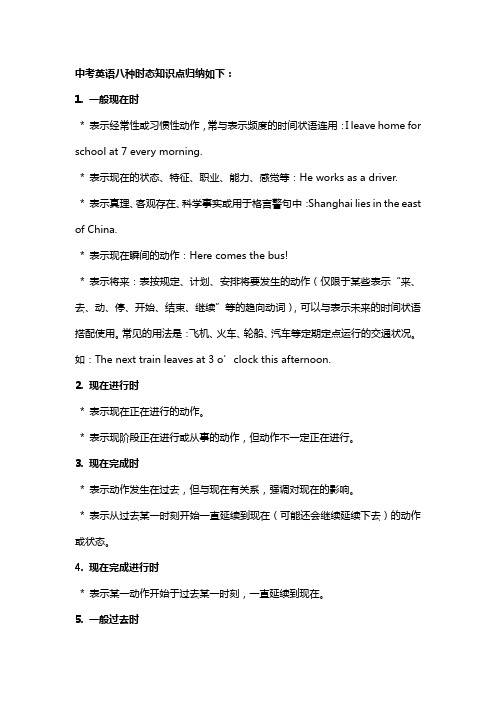
中考英语八种时态知识点归纳如下:1. 一般现在时* 表示经常性或习惯性动作,常与表示频度的时间状语连用:I leave home for school at 7 every morning.* 表示现在的状态、特征、职业、能力、感觉等:He works as a driver.* 表示真理、客观存在、科学事实或用于格言警句中:Shanghai lies in the east of China.* 表示现在瞬间的动作:Here comes the bus!* 表示将来:表按规定、计划、安排将要发生的动作(仅限于某些表示“来、去、动、停、开始、结束、继续”等的趋向动词),可以与表示未来的时间状语搭配使用。
常见的用法是:飞机、火车、轮船、汽车等定期定点运行的交通状况。
如:The next train leaves at 3 o’clock this afternoon.2. 现在进行时* 表示现在正在进行的动作。
* 表示现阶段正在进行或从事的动作,但动作不一定正在进行。
3. 现在完成时* 表示动作发生在过去,但与现在有关系,强调对现在的影响。
* 表示从过去某一时刻开始一直延续到现在(可能还会继续延续下去)的动作或状态。
4. 现在完成进行时* 表示某一动作开始于过去某一时刻,一直延续到现在。
5. 一般过去时* 表示过去某个时间发生的动作或存在的状态。
* 表示过去经常或反复发生的动作。
6. 过去进行时* 表示在过去某一时刻或某一段时间正在进行的动作。
7. 过去完成时* 表示在过去某一时刻之前已经完成或结束的动作或状态。
8. 一般将来时* 表示将来某个时间要发生的动作或存在的状态。
* 表示将来经常或反复发生的动作。
以上就是中考英语中常见的八种时态,希望对你有所帮助。
中考英语八种时态归纳

中考英语八种时态归纳时态是英语语法中一个非常重要的概念,它直接影响着句子的表达方式和意义。
对于中考英语考试来说,掌握八种基本时态是至关重要的。
本文将对这八种时态进行归纳总结,帮助同学们更好地理解和运用。
一、一般现在时(Simple Present Tense)一般现在时表示经常发生的情况、客观真理、习惯性动作和现阶段的状态。
例句:I play basketball every weekend.(我每个周末打篮球。
)The sun rises in the east.(太阳从东方升起。
)二、一般过去时(Simple Past Tense)一般过去时表示过去某个时间点发生的动作或存在的状态。
例句:I visited my grandparents last summer.(我去年夏天拜访了我的祖父母。
)She lived in London when she was young.(她年轻时住在伦敦。
)三、一般将来时(Simple Future Tense)一般将来时表示将来某个时间点将要发生的动作或存在的状态。
例句:We will have a party next weekend.(我们下个周末要开派对。
)He will be a doctor when he grows up.(他长大后会成为一名医生。
)四、现在进行时(Present Continuous Tense)现在进行时表示说话时正在进行的动作。
例句:They are studying in the library now.(他们现在正在图书馆学习。
)I am not feeling well today.(我今天感觉不舒服。
)五、过去进行时(Past Continuous Tense)过去进行时表示过去某个时间点正在进行的动作。
例句:She was watching TV when I called her.(我打电话给她时,她正在看电视。
中考语法时态知识点总结

中考语法时态知识点总结时态是英语语法中十分重要的知识点之一,它用来表示动作或状态发生的时间,主要包括一般现在时、一般过去时、一般将来时、现在进行时、过去进行时、过去将来时等。
正确使用时态可以帮助我们表达清晰、准确的意思。
下面我们就来总结一下中考语法中涉及的时态知识点。
一、一般现在时一般现在时表示经常性或习惯性的动作或状态,以及客观事实、科学真理等。
其结构为主语+动词原形(第三人称单数要在动词原形后加-s或-es)。
例如:1. I play basketball every day.2. He goes to school by bus.3. The sun rises in the east.二、一般过去时一般过去时表示过去某个时间发生的动作或状态,其结构为主语+动词过去式。
例如:1. I lived in London when I was a child.2. She finished her homework yesterday.3. They visited the museum last weekend.三、一般将来时一般将来时表示将来某个时间要发生的动作或状态,其结构为将来时助动词(shall/will)+动词原形。
例如:1. I will go to the park tomorrow.2. He shall finish his work next week.3. They will have a party on Friday.四、现在进行时现在进行时表示现阶段正在进行的动作或状态,其结构为主语+be动词(am/is/are)+动词的现在分词形式。
例如:1. I am watching TV now.2. She is doing her homework at the moment.3. They are playing football in the park.五、过去进行时过去进行时表示过去某个时间正在进行的动作或状态,其结构为主语+was/were+动词的现在分词形式。
中考专题——时态知识点梳理
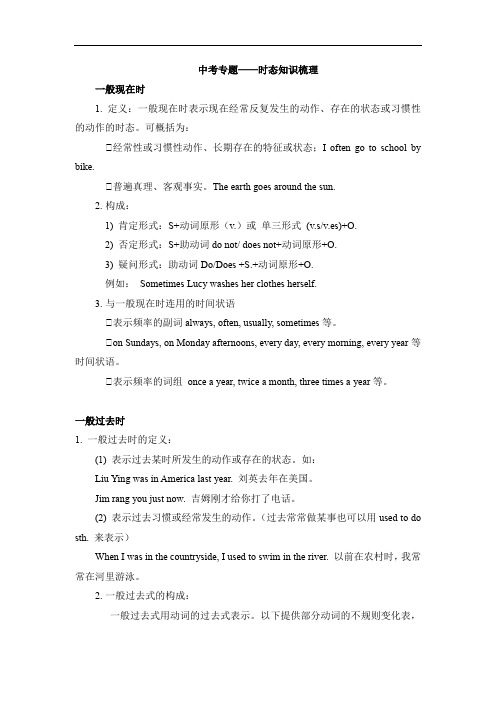
中考专题——时态知识梳理一般现在时1. 定义:一般现在时表示现在经常反复发生的动作、存在的状态或习惯性的动作的时态。
可概括为:①经常性或习惯性动作、长期存在的特征或状态;I often go to school by bike.①普遍真理、客观事实。
The earth goes around the sun.2.构成:1) 肯定形式:S+动词原形(v.)或单三形式(v.s/v.es)+O.2) 否定形式:S+助动词do not/ does not+动词原形+O.3) 疑问形式:助动词Do/Does +S.+动词原形+O.例如:Sometimes Lucy washes her clothes herself.3.与一般现在时连用的时间状语①表示频率的副词always, often, usually, sometimes等。
①on Sundays, on Monday afternoons, every day, every morning, every year等时间状语。
①表示频率的词组once a year, twice a month, three times a year等。
一般过去时1. 一般过去时的定义:(1) 表示过去某时所发生的动作或存在的状态。
如:Liu Ying was in America last year. 刘英去年在美国。
Jim rang you just now. 吉姆刚才给你打了电话。
(2) 表示过去习惯或经常发生的动作。
(过去常常做某事也可以用used to do sth. 来表示)When I was in the countryside, I used to swim in the river. 以前在农村时,我常常在河里游泳。
2.一般过去式的构成:一般过去式用动词的过去式表示。
以下提供部分动词的不规则变化表,包括动词的过去分词。
3.与一般过去时连用的时间状语:①常接时间副词often, usually, always, sometimes, every day / week, etc. 如:We often went out for a walk after supper. 我们过去常在晚饭后散步。
中考时态知识点归纳
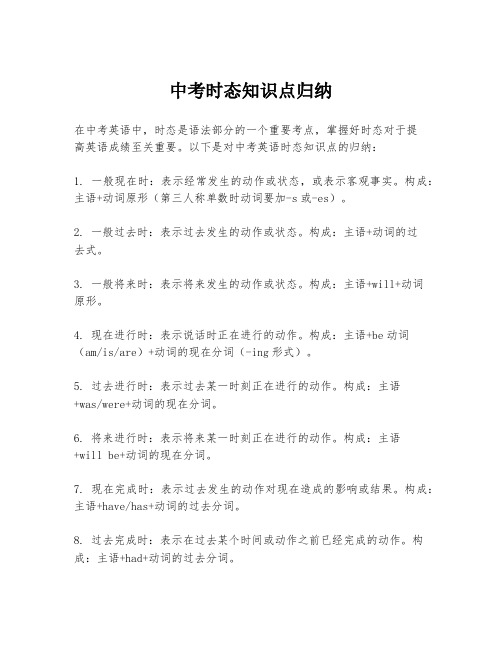
中考时态知识点归纳在中考英语中,时态是语法部分的一个重要考点,掌握好时态对于提高英语成绩至关重要。
以下是对中考英语时态知识点的归纳:1. 一般现在时:表示经常发生的动作或状态,或表示客观事实。
构成:主语+动词原形(第三人称单数时动词要加-s或-es)。
2. 一般过去时:表示过去发生的动作或状态。
构成:主语+动词的过去式。
3. 一般将来时:表示将来发生的动作或状态。
构成:主语+will+动词原形。
4. 现在进行时:表示说话时正在进行的动作。
构成:主语+be动词(am/is/are)+动词的现在分词(-ing形式)。
5. 过去进行时:表示过去某一时刻正在进行的动作。
构成:主语+was/were+动词的现在分词。
6. 将来进行时:表示将来某一时刻正在进行的动作。
构成:主语+will be+动词的现在分词。
7. 现在完成时:表示过去发生的动作对现在造成的影响或结果。
构成:主语+have/has+动词的过去分词。
8. 过去完成时:表示在过去某个时间或动作之前已经完成的动作。
构成:主语+had+动词的过去分词。
9. 将来完成时:表示将来某个时间之前已经完成的动作。
构成:主语+will have+动词的过去分词。
10. 现在完成进行时:表示从过去某一时间开始,一直持续到现在,并且可能还要继续下去的动作。
构成:主语+have/has been+动词的现在分词。
11. 过去完成进行时:表示在过去某一时间之前开始,一直持续到过去某一时间的动作。
构成:主语+had been+动词的现在分词。
12. 被动语态:表示动作的承受者而非执行者。
被动语态的构成根据时态不同而变化,一般形式为:be动词的各种时态形式+动词的过去分词。
掌握这些时态的构成和用法,对于理解和运用英语时态至关重要。
在复习时,可以通过做练习题、阅读例句和进行实际对话来加深理解。
同时,注意时态之间的转换和使用场合,以确保在中考中能够准确无误地使用各种时态。
结束语:通过上述的归纳,希望同学们能够对中考英语中的时态有一个清晰的认识和掌握,为中考取得优异成绩打下坚实的基础。
中考总复习之英语常见时态(整理版)

finish/end come go out
3.常见句型 3.常见句型 主句(现在完成时)+since 从句(一般过去时). 主句(现在完成时)+since 从句(一般过去时). It is +一段时间+ since 从句(一般过去时). +一段时间 一段时间+ 从句(一般过去时).
It is three days since they borrowed that book. They have kept that book for three days句子: 译下列句子: 短暂性动词不能跟表示一段时间的状语 3、这本书他买了一年了 连用, 连用 必须转变成持续性动词 He has bought this book for a year .× He has had this book for a year .
4、 这本书他借了三天了。 、 这本书他借了三天了。
Exercise
(2008衢州中考 衢州中考) 衢州中考 --- Why didn’t you come and open the door for me, dear? --- Sorry, Jack. I ______ in the kitchen and didn’t hear you. A.was cooking C. wave cooked B. am cooking D. will cook
一般现在时的注意点: 一般现在时的注意点:
1 、表客观事实或普遍真理 goes The earth _____ (go) round the sun . 2 、 在when ,as soon as, until, after, before等到引导的时间状语从句和 引导 等到引导的时间状语从句和if 等到引导的时间状语从句和 的条件状语从句中, 一般现在时表示将来 表示将来. 的条件状语从句中 用一般现在时表示将来
初三英语时态汇总(一般现在时、一般将来时、一般过去时和现在进行时、过去进行时、现在完成时、过去完成时)
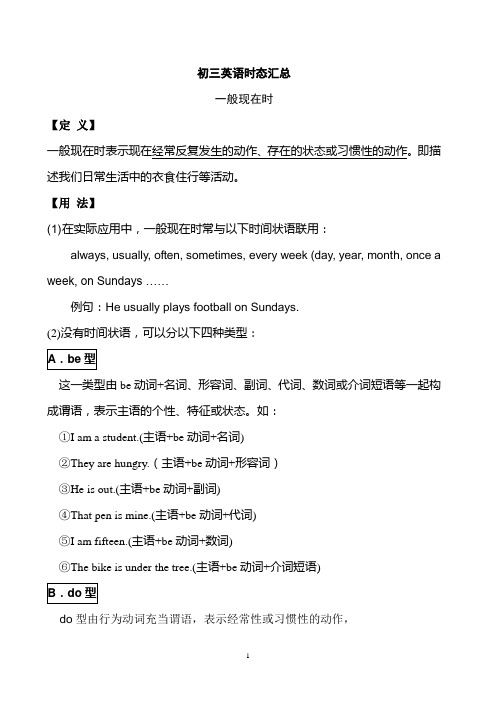
初三英语时态汇总一般现在时【定义】一般现在时表示现在经常反复发生的动作、存在的状态或习惯性的动作。
即描述我们日常生活中的衣食住行等活动。
【用法】(1) 在实际应用中,一般现在时常与以下时间状语联用:always, usually, often, sometimes, every week (day, year, month, once a week, on Sundays ……例句:He usually plays football on Sundays.(2)没有时间状语,可以分以下四种类型:这一类型由be动词+名词、形容词、副词、代词、数词或介词短语等一起构成谓语,表示主语的个性、特征或状态。
如:①I am a student.(主语+be动词+名词)②They are hungry.(主语+be动词+形容词)③He is out.(主语+be动词+副词)④That pen is mine.(主语+be动词+代词)⑤I am fifteen.(主语+be动词+数词)⑥The bike is under the tree.(主语+be动词+介词短语)do型由行为动词充当谓语,表示经常性或习惯性的动作,其构成为。
如:①I know it. ②He believes me.there be型句子表示“某地存在…”,其构成为,表示客观事实。
用法遵循,即主语是单数或并列主语中的第一个主语是单数,则用there is;主语是复数或并列主语中的第一个主语是复数,则用there are。
如:(1)There is an eraser on the teacher's desk.(主语an eraser是单数)(2)There is an orange,five apples and eight bananas in the bag.(并列主语中的第一个主语an orange是单数)情态动词型句子的构成为,情态动词和动词原形一起构成谓语,表示说话人对所叙述的动作或状态的看法。
初中英语中考各时态考点
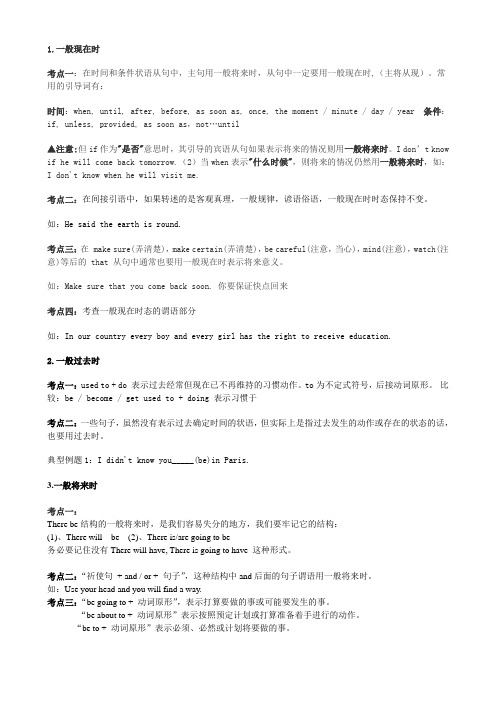
考点一:在时间和条件状语从句中,主句用一般将来时,从句中一定要用一般现在时,(主将从现)。
常用的引导词有:时间:when, until, after, before, as soon as, once, the moment / minute / day / year 条件:if, unless, provided, as soon as,not…until▲注意:但if作为"是否"意思时,其引导的宾语从句如果表示将来的情况则用一般将来时。
I don’t know if he will come back tomorrow.(2)当when表示"什么时候",则将来的情况仍然用一般将来时,如:I don't know when he will visit me.考点二:在间接引语中,如果转述的是客观真理,一般规律,谚语俗语,一般现在时时态保持不变。
如:He said the earth is round.考点三:在 make sure(弄清楚),make certain(弄清楚),be careful(注意,当心),mind(注意),watch(注意)等后的 that 从句中通常也要用一般现在时表示将来意义。
如:Make sure that you come back soon. 你要保证快点回来考点四:考查一般现在时态的谓语部分如:In our country every boy and every girl has the right to receive education.2.一般过去时考点一:used to + do 表示过去经常但现在已不再维持的习惯动作。
to为不定式符号,后接动词原形。
比较:be / become / get used to + doing 表示习惯于考点二:一些句子,虽然没有表示过去确定时间的状语,但实际上是指过去发生的动作或存在的状态的话,也要用过去时。
中考时态知识点归纳总结

中考时态知识点归纳总结时态是英语语法中非常重要的一个部分,它表示动作发生的时间。
掌握时态对于中考英语的阅读理解、完形填空、作文等部分都至关重要。
以下是中考时态知识点的归纳总结:1. 一般现在时:用来描述经常发生的动作、习惯或普遍真理。
例如:I go to school every day.2. 一般过去时:用来描述过去发生的动作或状态。
例如:I went to the library yesterday.3. 一般将来时:用来描述将来发生的动作或状态。
例如:I will goto the park tomorrow.4. 现在进行时:用来描述正在发生的动作。
例如:I am reading a book now.5. 过去进行时:用来描述过去某个时间正在进行的动作。
例如:Iwas watching TV at 9 o'clock last night.6. 将来进行时:用来描述将来某个时间正在进行的动作。
例如:Iwill be studying at 10 o'clock tomorrow morning.7. 现在完成时:用来描述过去开始的动作一直持续到现在,或对现在有影响。
例如:I have finished my homework.8. 过去完成时:用来描述在过去某个时间或动作之前已经完成的动作。
例如:I had finished my homework before you called.9. 将来完成时:用来描述将来某个时间之前会完成的动作。
例如:I will have finished my project by next month.10. 现在完成进行时:用来描述从过去开始一直持续到现在,并且可能还要继续下去的动作。
例如:I have been studying English for two years.11. 过去完成进行时:用来描述在过去某个时间之前已经开始,并且持续了一段时间的动作。
中考时态知识点归纳总结

中考时态知识点归纳总结时态,是英语语法中一个重要的部分。
在中考中,掌握时态的正确使用是非常重要的。
正确的时态选择可以准确表达动作的发生时间,使语言更加准确和流畅。
下面将对中考中常见的时态知识点进行归纳总结。
一、一般现在时(Simple Present Tense)1. 表示经常性、习惯性的动作或状态。
- We usually go to school by bus.- He always brushes his teeth before bedtime.2. 表示客观事实或普遍真理。
- The Earth orbits around the sun.- Water boils at 100 degrees Celsius.3. 表示现阶段的情况、观点等。
- My sister is in college.- I think this book is interesting.二、一般过去时(Simple Past Tense)1. 表示过去某个时间发生的动作或存在的状态。
- Yesterday, I visited the museum with my friends.- They lived in that house for five years.2. 表示过去的习惯性动作。
- When I was young, I played basketball every weekend.- She often sang songs in the shower.三、一般将来时(Simple Future Tense)1. 表示将来发生的动作或存在的状态。
- We will have a party next Friday.- She is going to visit her grandparents during the summer vacation.2. 表示计划、打算或意图。
- I am going to study abroad in the future.- They will start their own business after graduation.四、现在进行时(Present Continuous Tense)1. 表示现阶段在进行的动作。
2015中考英语(人教)语法专题复习:专题十 动词的时态(共55张PPT)

The twins will go to the cinema with their 例句 parents tonight. 这对双胞胎今晚和父母一起
去看电影。
备注 在时间和条件状语从句中,用一般现在时代 替一般将来时。
种类
现在进行时(2014年,2013年各2次,2012 年4次)
1.现在时刻动作:目前正在发生的动作。
第二部分 语专题突破
专题十 动词的时态
考点精析
分析近三年湖南中考真题可以看出,动词的时 态是湖南中考的必考点,且考查点较多。考查形式
为单句(词数6~20词左右,且以8词居多)和对话
(词数 11 ~ 20 词之间),且设空主要为 1 空,偶尔 涉及 2 空。话题倾向于休闲娱乐、假期计划、日常 生活,无热点信息。语境丰富,易于理解,无生词。
意义 2.现阶段动作:目前一个时期一直在进行的 动作,此刻不一定在进行。 构成 特点 时间 标志 am/is/are+动词的现在分词
now, at present, at the moment, these days, look, listen
词
例句
Look! What are the children doing over there? 看,孩子们在那边做什么? come, go, leave等少数动词的现在进行时形式 可表示将要发生的动作。
We went to the History Museum last Monday. 例句 上周一我们去了历史博物馆。 I was busy yesterday. 我昨天很忙。 备注 /
种类 一般将来时(2014年、2012年各3次) 意义 将来的动作或状态 构成 1.will(shall)+动词原形 特点 2.be going to+动词原形 时间 tonight, tomorrow, the day after tomorrow, 标志 from now on, soon, in the future, next year, 词 next week/month/term...(next系列)
中考时态总结重点回顾
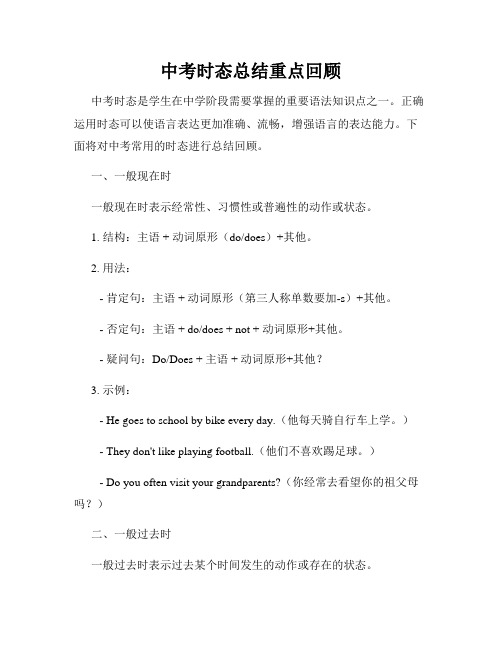
中考时态总结重点回顾中考时态是学生在中学阶段需要掌握的重要语法知识点之一。
正确运用时态可以使语言表达更加准确、流畅,增强语言的表达能力。
下面将对中考常用的时态进行总结回顾。
一、一般现在时一般现在时表示经常性、习惯性或普遍性的动作或状态。
1. 结构:主语 + 动词原形(do/does)+其他。
2. 用法:- 肯定句:主语 + 动词原形(第三人称单数要加-s)+其他。
- 否定句:主语 + do/does + not + 动词原形+其他。
- 疑问句:Do/Does + 主语 + 动词原形+其他?3. 示例:- He goes to school by bike every day.(他每天骑自行车上学。
) - They don't like playing football.(他们不喜欢踢足球。
)- Do you often visit your grandparents?(你经常去看望你的祖父母吗?)二、一般过去时一般过去时表示过去某个时间发生的动作或存在的状态。
1. 结构:主语 + 动词过去式(did)+其他。
2. 用法:- 肯定句:主语 + 动词过去式+其他。
- 否定句:主语 + did not + 动词原形+其他。
- 疑问句:Did + 主语 + 动词原形+其他?3. 示例:- She studied hard last night.(她昨晚努力学习了。
)- We didn't go to the park yesterday.(我们昨天没去公园。
)- Did you watch TV last weekend?(你上个周末看电视了吗?)三、现在进行时现在进行时表示现在或现阶段正在进行的动作。
1. 结构:主语 + am/is/are + 动词[-ing] +其他。
2. 用法:- 肯定句:主语 + am/is/are + 动词[-ing] +其他。
- 否定句:主语 + am/is/are + not + 动词[-ing] +其他。
中考初中八大时态总结归纳(精讲+总结+考点+练习+答案)
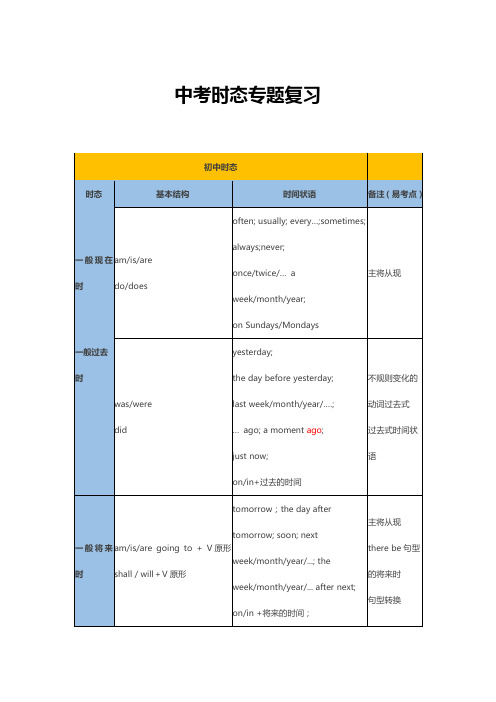
中考时态专题复习(一)一般现在时1.基本结构am/is/aredo/does2.句型:肯定:主+is/am/are 或者do/does否定:主+am/is/are+not 或者don’t/doesn’t +do 疑问:be动词+主…? 或者Do/Does+主…?3.用法经常习惯He often gets up at 6 in the morning.客观真理The moon goes round the earth.主将从现We will stay at home if it rains(二)一般过去时1.基本结构was/wereDid2.句型:肯定:主+was/were or did否定:主+wasn’t等or didn’t +do疑问:Was+主…?等or Did+主…?(三)一般将来时1.基本结构am/is/are going to + V原形shall/will+V原形2.句型:否定:主+be not going to +V原形/主+won’t+V原形疑问句:be+主+going to +V原形/will +主+V原形There be句型:There +am/is/are going to + beThere will be3.用法计划安排打算We’re going to hold a party next weekThey are going to be back tomorrow morning 根据迹象将要发生It’s going to rain outside进行时表将来V(come,go,start,begin,fly,arrive,stop,return) We are coming soon(四)过去将来时1.基本结构would+ V原形was/ were going to + V原形2.句型:否定: 主+would/should+do疑问: Had+主+done?(五)现在进行时1.基本结构am/ is/ are +V-ing2.句型:否定:主+is/am/are+ not + doing疑问:is/am/are + 主+ doing?3.用法正在进行We are having class now.现阶段发生He is writing a novel these days.反复性+强烈感情She is always helping others.(六)过去进行时1.基本结构:was/ were+ V-ing2.句型:主+ was/were(not) + doingWas/Were + 主+ doing?3.用法:过去正在发生We were cooking at this time yesterday.过去反复性+强烈感情Mum was always complaining.(七)现在完成时1.基本结构have/ has+done2.句型:否定:主+ haven’t/hasn’t+ done疑问:Have/Has + 主+ done?3.用法:过去发生对现在影响I have never read this book.过去发生持续至今We have lived in Xi’an for 10 years 判断:He has bought the car for 2 days.易考点:(1)瞬间动词与延续性动词borrow keepbuy havebecome bebegin/start be ondie be deadjoin be in/be member ofleave be awaycome be herego be therefinish be overleave be away fromget up be upmarry be married(2)Has been to /has gone to /has been in区分A:Is Mr.Wang at home?B:No,he is not in,he Beijing.My family Hongkong since 1998.He Shanghai three times.(八)过去完成时1.基本结构:had+ done2.句型:否定: 主+had+not+done疑问: Had+主+done?3.用法:过去的过去He had finished homework before we came.综合时态练习( )1. What _____ you _____ over the weekend?A. will; doB. does; doC. did; doD. were,; doing ( )2. Xiao Li usually _____ to school by bike last year.A. goesB. wentC. will goD. is going( )3. What _____ in our town 100 years from now?A. happenedB. is happenedC. has happenedD. will happen ( )4. Mr. Smith _____ to see you in an hour.A. cameB. has comeC. will comeD. comes( )5. _____ you _____ from your parents recently?A. Did; hearB. Have; heardC. Do; hearD. Will; hear ( )6. We _____ TV at home this time last night.A. were watchingB. watchedC. have watchedD. would watch( )7. We _____ over 1500 English words by the end of last month.A. have learnedB. had learnedC. will learnD. learnt( )8. She _____ in Shanghai for ten years since 1992.A. has livedB. had livedC. livedD. will live( )9. She _____ in Shanghai for ten years.A. has livedB. had livedC. livedD. will live( )10. We all know that the earth _____ round the sun.A. goesB. wentC. is goingD. will go( )11. “Where are the boys?”“They _____ soccer on the playground.”A. play B. are playing C. were playing D. played( )12. Look! Lucy _____ under the tree.A. readsB. is readingC. was readingD. read( )13. He _____ more than 200 model cars in the last five years.A. has collectedB. had collectedC. collectedD. will collect( )14. Jim _____ a letter to his parents at 7:30 last night.A. had writtenB. wroteC. would writeD. was writing( )15. The Smiths _____ in Beijing since two weeks ago.A. stayedB. were stayingC. would stayD. have stayed( )16. “When _____ you _____ the bike?”“Last Monday.”A. have; boughtB. did; buyC. will; buyD. do; buy( )17. Look! The boy _____English now.A. likesB. likedC. is likingD. was liking( )18. Most students in our class _____ TV twice a week.A. watchB. watchedC. will watchD. are watching( )19. How soon _____ they _____ back from work?A. do; comeB. did; comeC. have; comeD. will; come( )20. “Where _____ you _____ Mr. Li?”“In his office, half an hour ago.”A. will; see B. did; see C. have, seen D. do; see( )21. I _____ a new dictionary. Look! It’s very useful.A. boughtB. will buyC. have boughtD. would buy ( )22. I won’t watch the movie tonight. I _____ it before.A. will seeB. have seenC. sawD. had seen( )23. Hello! I _____ know you _____ in Chengdu. How long have you been here?A. didn’t; wereB. don’t areC. didn’t; areD. don’t; were ( )24. He _____ a fire and then cooked a meal.A. had madeB. was makingC. madeD. has made( )25. If I _____ time tomorrow, I will go to visit my grandfather.A. haveB. will haveC. would haveD. am having( )26. I’m going to be a doctor when I _____ up.A. growB. will growC. grewD. am growing( )27. The film _____ on for five minutes when I got to the cinema.A. has beenB. had beenC. wasD. is( )28. She _____ dinner when her son came in.A. has cookedB. had cookedC. was cookingD. would cook( )29. The train _____ when we got to the station. We had to wait for the next one.A. has leftB. had leftC. leftD. was leaving( )30. He said that he _____ to the barber’s tomorrow morning.A. will goB. wentC. is goingD. would go( )31. In the last years I _____ a lot of friends.A. have madeB. madeC. will makeD. was making ( )32. The boys _____ for about two hours.A. are playing soccerB. have been playing soccerC. were playingD. play soccer( )33. He _____ so quickly that he could win the race.A. is runningB. will runC. ranD. had run( )34. He didn’t go there with us because he _____ there before.A. has beenB. had beenC. wentD. would go( )35. I don’t know if he ______ tomorrow. If he _____, I will tell you.A. will come; will comeB. comes; comesC. will come; comesD. comes; will come( )36. When I was young, my mother told me that the sun _____ in the east.A. riseB. risesC. roseD. had risen( )37. “_____ you _____ your work?”“Yes. I finished it an hour ago.”A. Did; finish B. Have; finished C. Will; finish D. Had; finished( )38. Hurry up, or you _____ the early bus.A. will missB. has missedC. would missD. missed ( )39. I _____ Mr. Green while I _____ along the street last Sunday.A. met; walkedB. was meeting; walkedC. met; was walkingD. was meeting; was walking( )40. Tom is strong and he _____ to school every day.A. walkedB. walksC. will walkD. has walked( )41. He said that he _____ with Mr. Black at that time.A. talkedB. was talkingC. is talkingD. would talk( )42. We _____ English in this school since we came here.A. have studiedB. studiedC. had studiedD. were studying ( )43. She _____ at home until her mother came back.A. has stayedB. stayedC. had stayedD. will stay ( )44. There will be an interesting movie _____ two days.A. forB. inC. afterD. since( )45. She _____ there until I came back.A. didn’t leaveB. has stayedC. leftD. was staying( )46. It has been raining _____ two hours ago.A. untilB. forC. sinceD. by( )47. His father _____ since he was two years old.A. has diedB. diedC. has deathD. has been dead ( )48. The meeting _____ for ten minutes when I got there yesterday. A. has begun B. had begun C. has been on D. had been on ( )49. He had collected over 500 stamps _____ he was twelve years old.A. sinceB. forC. untilD. by the time( )50. I was doing my homework _____ she rang me up last night.A. whenB. whileC. sinceD. before( )51. “Where is John?”“He _____ the library.”A. has been toB. has gone toC. has been inD. has been at ( )52. How long _____ you _____ the computer?A. have; boughtB. did; buyC. have ; hadD. will; buy( )53. She _____ Shanghai for two days.A. leftB. has leftC. will leaveD. has been away from ( )54. He didn’t tell me anything about it _____ he left.A. sinceB. untilC. by the timeD. while( )55. She _____ China since she was five years old.A. has come toB. has arrived atC. has arrived inD. has been in( )56. I had finished my homework _____ I watched TV last night.A. beforeB. afterC. whenD. until( )57. Miss White has been _____ the music club for 4 years.A. joiningB. joinC. joinedD. in( )58. What do you think he will _____ ten years?A. be forB. be atC. be toD. be in( )59. There _____ two football games in our school next week.A. is going to beB. will haveC. will beD. is going to have ( )60. They _____ a birthday party next Friday afternoon.A. is going to beB. will beC. will haveD. is going to have ( )61. How long have you ____ the pen?A. keptB. boughtC. borrowedD. got( )62. I _____ Mr. Brown since I left Shanghai in 2004.A. have seenB. sawC. haven’t seenD. didn’t see( )63. You don’t have to describe her. I _____ her several times.A. had metB. have metC. metD. meet( )64. I _____ a cold for five days. I still can’t get rid of it.A. caughtB. hadC. have caughtD. have had( )65. What _____ you _____ at nine o’clock that morning?A. are; doingB. did; doC. were; doingD. had; done( )66. What _____ you _____ by nine o’clock that morning?A. are; doingB. did; doC. were; doingD. had; done( )67. The sign _____, “No Parking!”A. readsB. was readC. is readingD. read( )68. “_____ you _____ your lunch?”“Yes. I _____ it at school.”A. Did; have; have hadB. Have; had; hadC. Did; have; hadD. Have; had; have( )69. Lily _____ for her mother until she _____ home.A. will wait; will comeB. won’t wait; comesC. will wait; comesD. waits; will come( )70. “Mr. Brown is leaving for a trip.”“Really? Where _____ he _____?”A. has; gone B. will; go C. did; go D. does; go( )71. Tom, you _____ the book for two weeks. You have to return it now.A. borrowedB. have borrowedC. keptD. have kept( )72. “Have you mended your shoes?”“Yes. I _____ it twenty minutes ago.”A. have mendedB. mendedC. had mendedD. will mend( )73. Mr. Smith _____ to China last year and _____ in love with her.A. goes; fallsB. went; fellC. went; feltD. has gone; fell( )74. If you don’t go to the meeting tomorrow, _____.A. he will, tooB. he won’t, eitherC. he does, tooD. he doesn’t, either ( )75. “Shall we go watching the match?”“Sorry, I can’t. I _____ my homework.”A. doB. have doneC. am doingD. did( )76. The children won’t go hiking if it _____ next Sunday.A. rainB. rainsC. will rainD. is raining( )77. “_____ you _____ to Japan?”“Yes. I will go there next month.”A. Have; beenB. Have; goneC. Are; goingD. Did; go( )78. When I got there, the film _____ for five minutes.A. had been onB. had begunC. was beginningD. began( )79. Don’t open the door until the bus _____.A. will stopB. doesn’t stopC. is stoppingD. stops( )80. “_____ you _____ to Japan?”“Yes. We went there last year.”A. Have; beenB. Have; goneC. Did; goD. Are; going参考答案:1-5 CBDCB 6-10 ABBAA 11-15 BBADD 16-20 BAADB 21-25 CBACA 26-30 ABCBD 31-35 ABCBC 36-40 BBACB 41-45 BABBA 46-50 CDDDA 51-55 BCDBD 56-60 ADDCC 61-65 ACBDC 66-70 DABCB 71-75 BBBBC 76-80 BCADA。
时态中考知识点总结
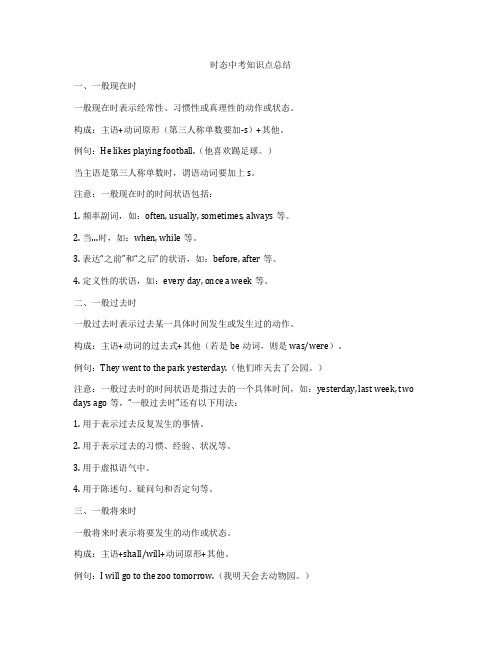
时态中考知识点总结一、一般现在时一般现在时表示经常性、习惯性或真理性的动作或状态。
构成:主语+动词原形(第三人称单数要加-s)+其他。
例句:He likes playing football.(他喜欢踢足球。
)当主语是第三人称单数时,谓语动词要加上s。
注意:一般现在时的时间状语包括:1. 频率副词,如:often, usually, sometimes, always等。
2. 当…时,如:when, while等。
3. 表达“之前”和“之后”的状语,如:before, after等。
4. 定义性的状语,如:every day, once a week等。
二、一般过去时一般过去时表示过去某一具体时间发生或发生过的动作。
构成:主语+动词的过去式+其他(若是be动词,则是was/were)。
例句:They went to the park yesterday.(他们昨天去了公园。
)注意:一般过去时的时间状语是指过去的一个具体时间,如:yesterday, last week, two days ago等,“一般过去时”还有以下用法:1. 用于表示过去反复发生的事情。
2. 用于表示过去的习惯、经验、状况等。
3. 用于虚拟语气中。
4. 用于陈述句、疑问句和否定句等。
三、一般将来时一般将来时表示将要发生的动作或状态。
构成:主语+shall/will+动词原形+其他。
例句:I will go to the zoo tomorrow.(我明天会去动物园。
)注意:一般将来时的时间状语有tomorrow, the day after tomorrow, next week, next month, in the future等。
一般将来时的用法:1. 表示将要发生的动作。
2. 表示将来的打算、意图、决定等。
3. 表示预测或描写将来可能发生的事情。
4. 表示请求、命令、希望、承诺等。
四、进行时进行时表示正在进行或发生的动作。
(中考英语资料)初中英语语法八大时态总结(完整版)含答案
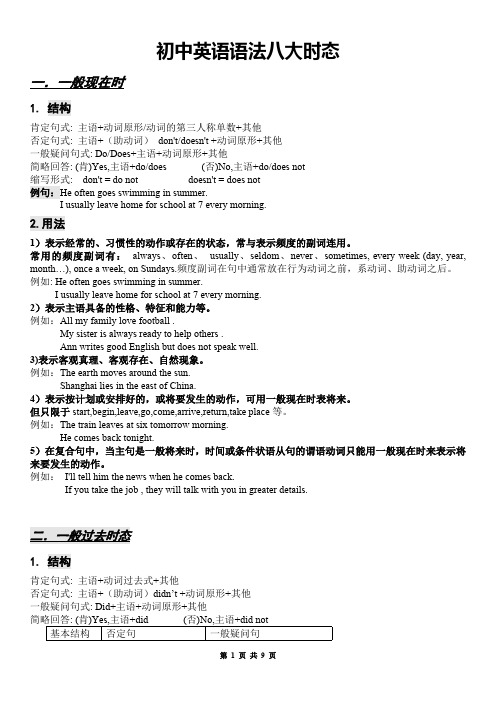
初中英语语法八大时态一.一般现在时1. 结构肯定句式: 主语+动词原形/动词的第三人称单数+其他否定句式: 主语+(助动词)don't/doesn't +动词原形+其他一般疑问句式: Do/Does+主语+动词原形+其他简略回答: (肯)Yes,主语+do/does (否)No,主语+do/does not缩写形式: don't = do not doesn't = does not例句:He often goes swimming in summer.I usually leave home for school at 7 every morning.2.用法1)表示经常的、习惯性的动作或存在的状态,常与表示频度的副词连用。
常用的频度副词有:always、often、usually、seldom、never、sometimes, every week (day, year, month…), once a week, on Sundays.频度副词在句中通常放在行为动词之前,系动词、助动词之后。
例如: He often goes swimming in summer.I usually leave home for school at 7 every morning.2)表示主语具备的性格、特征和能力等。
例如:All my family love football .My sister is always ready to help others .Ann writes good English but does not speak well.3)表示客观真理、客观存在、自然现象。
例如:The earth moves around the sun. Shanghai lies in the east of China.4)表示按计划或安排好的,或将要发生的动作,可用一般现在时表将来。
初中英语中考必会时态归纳(共16种)
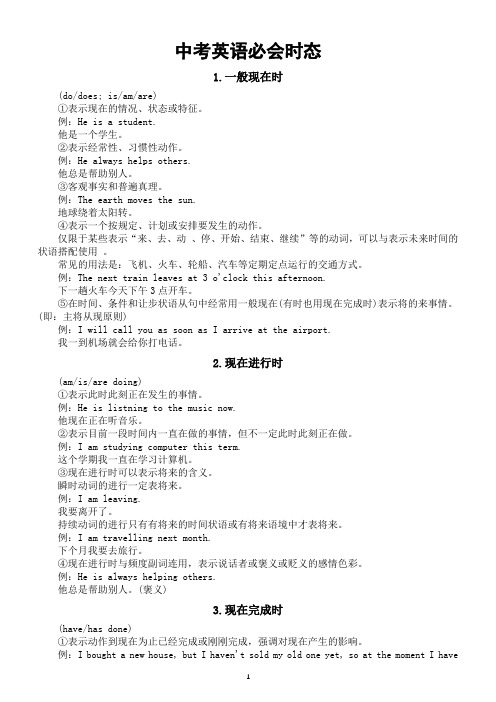
中考英语必会时态1.一般现在时(do/does; is/am/are)①表示现在的情况、状态或特征。
例:He is a student.他是一个学生。
②表示经常性、习惯性动作。
例:He always helps others.他总是帮助别人。
③客观事实和普遍真理。
例:The earth moves the sun.地球绕着太阳转。
④表示一个按规定、计划或安排要发生的动作。
仅限于某些表示“来、去、动、停、开始、结束、继续”等的动词,可以与表示未来时间的状语搭配使用。
常见的用法是:飞机、火车、轮船、汽车等定期定点运行的交通方式。
例:The next train leaves at 3 o'clock this afternoon.下一趟火车今天下午3点开车。
⑤在时间、条件和让步状语从句中经常用一般现在(有时也用现在完成时)表示将的来事情。
(即:主将从现原则)例:I will call you as soon as I arrive at the airport.我一到机场就会给你打电话。
2.现在进行时(am/is/are doing)①表示此时此刻正在发生的事情。
例:He is listning to the music now.他现在正在听音乐。
②表示目前一段时间内一直在做的事情,但不一定此时此刻正在做。
例:I am studying computer this term.这个学期我一直在学习计算机。
③现在进行时可以表示将来的含义。
瞬时动词的进行一定表将来。
例:I am leaving.我要离开了。
持续动词的进行只有有将来的时间状语或有将来语境中才表将来。
例:I am travelling next month.下个月我要去旅行。
④现在进行时与频度副词连用,表示说话者或褒义或贬义的感情色彩。
例:He is always helping others.他总是帮助别人。
(褒义)3.现在完成时(have/has done)①表示动作到现在为止已经完成或刚刚完成,强调对现在产生的影响。
中考英语主要时态归纳总结
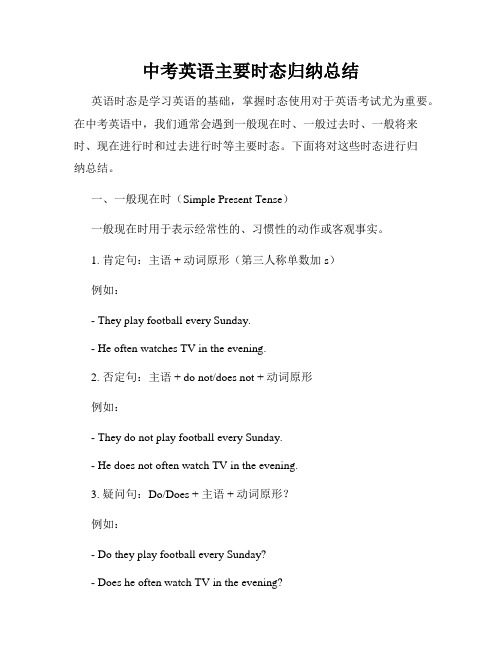
中考英语主要时态归纳总结英语时态是学习英语的基础,掌握时态使用对于英语考试尤为重要。
在中考英语中,我们通常会遇到一般现在时、一般过去时、一般将来时、现在进行时和过去进行时等主要时态。
下面将对这些时态进行归纳总结。
一、一般现在时(Simple Present Tense)一般现在时用于表示经常性的、习惯性的动作或客观事实。
1. 肯定句:主语 + 动词原形(第三人称单数加s)例如:- They play football every Sunday.- He often watches TV in the evening.2. 否定句:主语 + do not/does not + 动词原形例如:- They do not play football every Sunday.- He does not often watch TV in the evening.3. 疑问句:Do/Does + 主语 + 动词原形?例如:- Do they play football every Sunday?- Does he often watch TV in the evening?二、一般过去时(Simple Past Tense)一般过去时用于表示发生在过去某个时间的动作或状态。
1. 肯定句:主语 + 动词过去式例如:- I visited my grandparents last weekend.- She bought a new dress yesterday.2. 否定句:主语 + did not + 动词原形例如:- I did not visit my grandparents last weekend.- She did not buy a new dress yesterday.3. 疑问句:Did + 主语 + 动词原形?例如:- Did you visit your grandparents last weekend?- Did she buy a new dress yesterday?三、一般将来时(Simple Future Tense)一般将来时用于表示将来要发生的动作或存在的状态。
- 1、下载文档前请自行甄别文档内容的完整性,平台不提供额外的编辑、内容补充、找答案等附加服务。
- 2、"仅部分预览"的文档,不可在线预览部分如存在完整性等问题,可反馈申请退款(可完整预览的文档不适用该条件!)。
- 3、如文档侵犯您的权益,请联系客服反馈,我们会尽快为您处理(人工客服工作时间:9:00-18:30)。
中考时态考点梳理动词时态是各地中考试题中必考的知识点,也是考查的重点。
然而,初中英语时态多达八种,并且近几年中考在考查时态时,形式灵活多样,尤其是我们河北省近几年的中考,多体现在上下文语境中,这样无形中就增加了试题的难度,使得一些考生总感觉时态题不可捉摸,无规律可循。
其实,你只要弄清楚了时态题的命题方法和解题方法,也就不难了。
一、巧抓时间标志词,快解时态题由于绝大多数的中考英语试卷同时具有毕业检测与升学选拔的双重功效,所以对时态的考查在很大程度上还是停留在识记和简单应用的层次上。
为此,命题人在命题时,往往会借助一些关键的时间标志词来给考生以解题的“暗示”。
所以,同学们在解题时,应该抓住关键“时间类标志词”,从而达到快解时态题的“神效”。
【中考例题】1.(2015 陕西) Many city people their bikes to work every day.A.rideB. will rideC. rodeD. have ridden2.(2015 武汉) —A nice car! Is it yours?—No, it isn’t. I it from a friend of mine two days ago.A.borrowB. have borrowedC. will borrowD. borrowed3.(2015 黄石) The writer and speaker a speech on Chinese culture in the hall now.A.are givingB. is givingC. will giveD. has given4.(2015 齐齐哈尔) Alice for the bus at seven yesterday morning.A.waitedB. was waitingC. is waitingD. will wait5.(2015 福州) So far, the AIIB (亚投行) 57 countries to be the founding members.A.attractedB. has attractedC. will attractD. is attracting6.(2015 龙东) By the time I got back to school, the bell .A.rangB. has rungC. had rungD. will ring7.(2015 抚顺) —Why are you so happy? —My friend me nextmonth.A.visitsB. was visitingC. will visitD. visited【知识锦囊】动词时态一般都有其相对应的时间状语,请熟记下列时态所对应的时间状语。
【应试对策】中考测试动词时态必须与句中时间状语一致时,常在题干中加入具体的交际情景,以测试学生对动词时态知识的实际运用能力。
因此,同学们要敏锐捕捉句中的时间标志词,并且结合具体的语境,来确定动词的时态。
二、巧抓主从句时态的呼应,快解时态题考查主从句时态的呼应是各地中考命题的特点,特别是将其放在比较真实的语境中进行考查。
有时,命题者为了增加试题的难度,还会将两种从句进行糅合,来考查学生对时态的辨析能力。
【中考例题】8.(2015 潍坊) Next month we’re going somewhere as soon as the holiday .A.will beginB. has begunC. beginsD. is beginning9.(2015 孝感) We will go to Tian’anmen Square to watch the raising of national flag if ittomorrow.A.will rainB. rainsC. doesn’t rainD. won’t rain10.(2015 南充) We don’t know when next week. Please call me when he arrives.A.will he arriveB. does he arriveC. he will arriveD. he arrives11.(2015 无锡) Too many people were absent. The chairperson warned that he _______ themeeting if necessary.A.would cancelB. cancelledC. would startD. started12.(2015 雅安) The teacher told us that the sun in the east.A.had risenB. has risenC. roseD. rises【应试对策】在根据时态呼应原则解题时,要把握好以下两点:1.在由when,before,after,until,as soon as 引导的时间状语从句以及由if,unless,as long as 引导的条件状语从句中,常用一般现在时表将来。
2.解答宾语从句与主句时态呼应题时,我们应熟知一下规则:如果主句的谓语动词是一般现在时,从句的谓语动词可根据需要,选用相应的时态;如果主句的谓语动词是过去时,宾语从句的谓语动词选用过去时态的某一种形式;如果宾语从句叙述的是客观事实、普遍真理、自然现象或是习惯性动作等,不管主句用什么时态,从句都用一般现在时。
三、巧抓试题的语境,快解时态题对着课改的深入和中考命题手法的不断创新,近年来中考试题对时态考查的要求也越来越高,大部分试题趋向情境化。
这就对学生的语言基本功和语言运用的能力提出了较高的要求。
【中考例题】13.(2015 菏泽) —Hi, Wang Ning! How’s the weather in Heze now?—It is terrible. It all the morning.A.rainsB. is rainingC. rainD. would rain14.(2015 南京) —When will Uncle Sam come to see us?—He’ll visit us this weekend. He me that by e-mail.A.toldB. is toldC. will tellD. was going to tell15.(2015 江西) —Do you have any plans for tonight?—Yes, I at the new Italian restaurant in town.A.eatB. have eatenC. ateD. am going to eat16.(2015 江西) —Ben and Sue aren’t home, aren’t they?—No. They to London on business.A.have goneB. goC. have beenD. will go【应试对策】想要准确地解答语境题型时态题,首先要通读试题,认真领悟语境,来捕捉有效地解题信息。
在此基础上,可以快速剔除两个最弱的干扰项。
接着再结合语境,综合运用所学的时态方面的知识,对剩下的两个选项进行比较,最终确定最佳答案。
四、中考对各种时态的考查第一组:一般现在时一般现在时常用来描述经常出现、反复发生的动作或存在的状态,句子常带有特定的状语(如every day, always, often, sometimes, seldom, usually, nowadays 等)。
此外,在陈述客观事实或客观真理时,也常用一般现在时。
此外,在含有时间、条件等状语从句的复合句中,当主句为一般将来时时,时间、条件等状语从句中的谓语动词用一般现在时表示将来。
【中考例题】17.(2014 北京) —What do you often do at weekends?—I often my grandparents.A.visitB. visitedC. have visitedD. will visit18.(2014 温州) Alice likes doing housework. Sheher room every afternoon.A.cleansB. cleanedC. is cleaningD. has cleaned19.(2014 武汉) —Do you know if Jack will drive to London this weekend?—Jack? Never! He driving so far.A.has hatedB. will hateC. hatedD. hates20.(2014 上海) Aunt Lucy will tell us something about her trip to Australia when she back.A.cameB. comesC. would comeD. will come—Go to bed first. I will wake you up as soon as the match .A.startsB. startedC. will startD. is starting22.(2014 东营) Eating and drinking on Beijing subway is not allowed. If you the rule,you’ll face a fine (罚款) of up to 5000 yuan.A.brokeB. breakC. will breakD. have broken23.(2014 滨州) —Do you know if he will come tomorrow?—No, but if he , I’ll call you to have a meal together.A.will comeB. won’t comeC. comesD. doesn’t come第二组:一般过去时一般过去时表示在过去的某时或一段时间内发生的动作或存在的状态,通常与yesterday, the day before yesterday, last week / month / year, the other day, just now, two days ago, at that time, in 2012 等时间状语连用。
【中考例题】24.(2014 长沙) —You brother is an excellent basketball player.—So he is. He to play basketball three years ago.A.has startedB. startsC. startedD. will start25.(2014 龙岩) The 2014 FIFA World Cup in Brazil on June 13th.A.is openingB. has openedC. openedD. opens26.(2014 乐山) —Why didn’t Mary come to John’s birthday party last night?—She to, but he dad simply would not let her our so late at night.A.wantsB. wantedC. has wantedD. will want27.(2014 武汉) —A nice car! A present?—Yes, it is. My aunt it to me for my last birthday.A.was sendingB. had sentC. will sendD. sent28.(2014 连云港) Beijing and Zhangjiakou applying to host the 2022 WinterOlympicsGames in 2013.A.beginB. beganC. have begunD. had begun29.(2014 陕西) —Have you finished your homework yet?—Yes. I it twenty minutes ago.A.have finishedB. finishedC. will finishD. had finished第三组:一般将来时一般将来时主要用来描述将要发生的动作或未来将要出现的情况,一般将来时常与tomorrow, next week, in a week, sson 等表示将来的时间状语连用。
